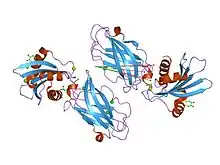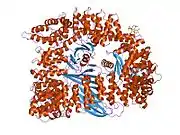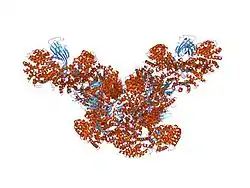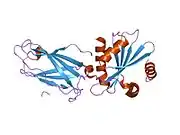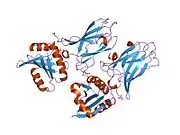AP-2 complex subunit beta is a protein that in humans is encoded by the AP2B1 gene.[3][4][5]
Function
The protein encoded by this gene is one of two large chain components of the AP2 adaptor complex, which serves to link clathrin to receptors in coated vesicles. The encoded protein is found on the cytoplasmic face of coated vesicles in the plasma membrane. Two transcript variants encoding different isoforms have been found for this gene.[5]
Interactions
AP2B1 has been shown to interact with:
References
- 1 2 3 GRCh38: Ensembl release 89: ENSG00000006125 - Ensembl, May 2017
- ↑ "Human PubMed Reference:". National Center for Biotechnology Information, U.S. National Library of Medicine.
- ↑ Gallusser A, Kirchhausen T (Dec 1993). "The beta 1 and beta 2 subunits of the AP complexes are the clathrin coat assembly components". The EMBO Journal. 12 (13): 5237–44. doi:10.1002/j.1460-2075.1993.tb06219.x. PMC 413789. PMID 8262066.
- ↑ Druck T, Gu Y, Prabhala G, Cannizzaro LA, Park SH, Huebner K, Keen JH (Nov 1995). "Chromosome localization of human genes for clathrin adaptor polypeptides AP2 beta and AP50 and the clathrin-binding protein, VCP". Genomics. 30 (1): 94–7. doi:10.1006/geno.1995.0016. PMID 8595912.
- 1 2 "Entrez Gene: AP2B1 adaptor-related protein complex 2, beta 1 subunit".
- 1 2 Rual JF, Venkatesan K, Hao T, Hirozane-Kishikawa T, Dricot A, Li N, Berriz GF, Gibbons FD, Dreze M, Ayivi-Guedehoussou N, Klitgord N, Simon C, Boxem M, Milstein S, Rosenberg J, Goldberg DS, Zhang LV, Wong SL, Franklin G, Li S, Albala JS, Lim J, Fraughton C, Llamosas E, Cevik S, Bex C, Lamesch P, Sikorski RS, Vandenhaute J, Zoghbi HY, Smolyar A, Bosak S, Sequerra R, Doucette-Stamm L, Cusick ME, Hill DE, Roth FP, Vidal M (Oct 2005). "Towards a proteome-scale map of the human protein-protein interaction network". Nature. 437 (7062): 1173–8. Bibcode:2005Natur.437.1173R. doi:10.1038/nature04209. PMID 16189514. S2CID 4427026.
- ↑ Laporte SA, Oakley RH, Zhang J, Holt JA, Ferguson SS, Caron MG, Barak LS (Mar 1999). "The beta2-adrenergic receptor/betaarrestin complex recruits the clathrin adaptor AP-2 during endocytosis". Proceedings of the National Academy of Sciences of the United States of America. 96 (7): 3712–7. Bibcode:1999PNAS...96.3712L. doi:10.1073/pnas.96.7.3712. PMC 22359. PMID 10097102.
- ↑ Kim YM, Benovic JL (Aug 2002). "Differential roles of arrestin-2 interaction with clathrin and adaptor protein 2 in G protein-coupled receptor trafficking". The Journal of Biological Chemistry. 277 (34): 30760–8. doi:10.1074/jbc.M204528200. PMID 12070169.
- ↑ Cayrol C, Cougoule C, Wright M (Nov 2002). "The beta2-adaptin clathrin adaptor interacts with the mitotic checkpoint kinase BubR1". Biochemical and Biophysical Research Communications. 298 (5): 720–30. doi:10.1016/s0006-291x(02)02522-6. PMID 12419313.
- ↑ He G, Gupta S, Yi M, Michaely P, Hobbs HH, Cohen JC (Nov 2002). "ARH is a modular adaptor protein that interacts with the LDL receptor, clathrin, and AP-2". The Journal of Biological Chemistry. 277 (46): 44044–9. doi:10.1074/jbc.M208539200. PMID 12221107.
- ↑ Yao D, Ehrlich M, Henis YI, Leof EB (Nov 2002). "Transforming growth factor-beta receptors interact with AP2 by direct binding to beta2 subunit". Molecular Biology of the Cell. 13 (11): 4001–12. doi:10.1091/mbc.02-07-0104. PMC 133610. PMID 12429842.
Further reading
- Kirchhausen T (2000). "Clathrin". Annual Review of Biochemistry. 69: 699–727. doi:10.1146/annurev.biochem.69.1.699. PMID 10966473.
- Geyer M, Fackler OT, Peterlin BM (Jul 2001). "Structure--function relationships in HIV-1 Nef". EMBO Reports. 2 (7): 580–5. doi:10.1093/embo-reports/kve141. PMC 1083955. PMID 11463741.
- Ponnambalam S, Robinson MS, Jackson AP, Peiperl L, Parham P (Mar 1990). "Conservation and diversity in families of coated vesicle adaptins". The Journal of Biological Chemistry. 265 (9): 4814–20. doi:10.1016/S0021-9258(19)34045-1. PMID 1969413.
- Greenberg ME, Bronson S, Lock M, Neumann M, Pavlakis GN, Skowronski J (Dec 1997). "Co-localization of HIV-1 Nef with the AP-2 adaptor protein complex correlates with Nef-induced CD4 down-regulation". The EMBO Journal. 16 (23): 6964–76. doi:10.1093/emboj/16.23.6964. PMC 1170300. PMID 9384576.
- Lim DS, Kirsch DG, Canman CE, Ahn JH, Ziv Y, Newman LS, Darnell RB, Shiloh Y, Kastan MB (Aug 1998). "ATM binds to beta-adaptin in cytoplasmic vesicles". Proceedings of the National Academy of Sciences of the United States of America. 95 (17): 10146–51. Bibcode:1998PNAS...9510146L. doi:10.1073/pnas.95.17.10146. PMC 21476. PMID 9707615.
- Greenberg M, DeTulleo L, Rapoport I, Skowronski J, Kirchhausen T (Nov 1998). "A dileucine motif in HIV-1 Nef is essential for sorting into clathrin-coated pits and for downregulation of CD4". Current Biology. 8 (22): 1239–42. doi:10.1016/S0960-9822(07)00518-0. PMID 9811611. S2CID 14272751.
- Berlioz-Torrent C, Shacklett BL, Erdtmann L, Delamarre L, Bouchaert I, Sonigo P, Dokhelar MC, Benarous R (Feb 1999). "Interactions of the cytoplasmic domains of human and simian retroviral transmembrane proteins with components of the clathrin adaptor complexes modulate intracellular and cell surface expression of envelope glycoproteins". Journal of Virology. 73 (2): 1350–61. doi:10.1128/JVI.73.2.1350-1361.1999. PMC 103959. PMID 9882340.
- Owen DJ, Vallis Y, Pearse BM, McMahon HT, Evans PR (Aug 2000). "The structure and function of the beta 2-adaptin appendage domain". The EMBO Journal. 19 (16): 4216–27. doi:10.1093/emboj/19.16.4216. PMC 302036. PMID 10944104.
- Fan GH, Yang W, Wang XJ, Qian Q, Richmond A (Jan 2001). "Identification of a motif in the carboxyl terminus of CXCR2 that is involved in adaptin 2 binding and receptor internalization". Biochemistry. 40 (3): 791–800. doi:10.1021/bi001661b. PMC 2664867. PMID 11170396.
- Swigut T, Shohdy N, Skowronski J (Apr 2001). "Mechanism for down-regulation of CD28 by Nef". The EMBO Journal. 20 (7): 1593–604. doi:10.1093/emboj/20.7.1593. PMC 145469. PMID 11285224.
- Laporte SA, Miller WE, Kim KM, Caron MG (Mar 2002). "beta-Arrestin/AP-2 interaction in G protein-coupled receptor internalization: identification of a beta-arrestin binging site in beta 2-adaptin". The Journal of Biological Chemistry. 277 (11): 9247–54. doi:10.1074/jbc.M108490200. PMID 11777907.
- Collins BM, McCoy AJ, Kent HM, Evans PR, Owen DJ (May 2002). "Molecular architecture and functional model of the endocytic AP2 complex". Cell. 109 (4): 523–35. doi:10.1016/S0092-8674(02)00735-3. PMID 12086608. S2CID 483953.
- He G, Gupta S, Yi M, Michaely P, Hobbs HH, Cohen JC (Nov 2002). "ARH is a modular adaptor protein that interacts with the LDL receptor, clathrin, and AP-2". The Journal of Biological Chemistry. 277 (46): 44044–9. doi:10.1074/jbc.M208539200. PMID 12221107.
- Cayrol C, Cougoule C, Wright M (Nov 2002). "The beta2-adaptin clathrin adaptor interacts with the mitotic checkpoint kinase BubR1". Biochemical and Biophysical Research Communications. 298 (5): 720–30. doi:10.1016/S0006-291X(02)02522-6. PMID 12419313.
- Yao D, Ehrlich M, Henis YI, Leof EB (Nov 2002). "Transforming growth factor-beta receptors interact with AP2 by direct binding to beta2 subunit". Molecular Biology of the Cell. 13 (11): 4001–12. doi:10.1091/mbc.02-07-0104. PMC 133610. PMID 12429842.
- Kalthoff C, Groos S, Kohl R, Mahrhold S, Ungewickell EJ (Nov 2002). "Clint: a novel clathrin-binding ENTH-domain protein at the Golgi". Molecular Biology of the Cell. 13 (11): 4060–73. doi:10.1091/mbc.E02-03-0171. PMC 133614. PMID 12429846.
External links
- Human AP2B1 genome location and AP2B1 gene details page in the UCSC Genome Browser.
This article is issued from Wikipedia. The text is licensed under Creative Commons - Attribution - Sharealike. Additional terms may apply for the media files.




